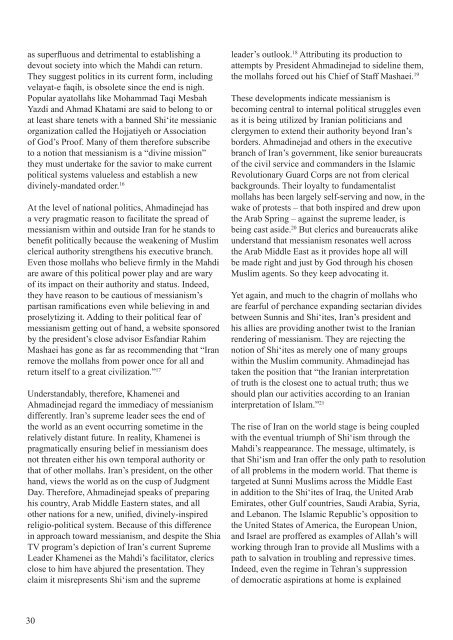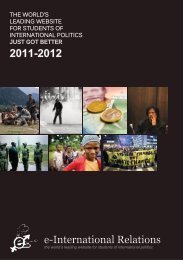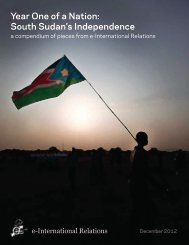The Arab Spring of Discontent - e-International Relations
The Arab Spring of Discontent - e-International Relations
The Arab Spring of Discontent - e-International Relations
You also want an ePaper? Increase the reach of your titles
YUMPU automatically turns print PDFs into web optimized ePapers that Google loves.
as superfluous and detrimental to establishing a<br />
devout society into which the Mahdi can return.<br />
<strong>The</strong>y suggest politics in its current form, including<br />
velayat-e faqih, is obsolete since the end is nigh.<br />
Popular ayatollahs like Mohammad Taqi Mesbah<br />
Yazdi and Ahmad Khatami are said to belong to or<br />
at least share tenets with a banned Shi‘ite messianic<br />
organization called the Hojjatiyeh or Association<br />
<strong>of</strong> God’s Pro<strong>of</strong>. Many <strong>of</strong> them therefore subscribe<br />
to a notion that messianism is a “divine mission”<br />
they must undertake for the savior to make current<br />
political systems valueless and establish a new<br />
divinely-mandated order. 16<br />
At the level <strong>of</strong> national politics, Ahmadinejad has<br />
a very pragmatic reason to facilitate the spread <strong>of</strong><br />
messianism within and outside Iran for he stands to<br />
benefit politically because the weakening <strong>of</strong> Muslim<br />
clerical authority strengthens his executive branch.<br />
Even those mollahs who believe firmly in the Mahdi<br />
are aware <strong>of</strong> this political power play and are wary<br />
<strong>of</strong> its impact on their authority and status. Indeed,<br />
they have reason to be cautious <strong>of</strong> messianism’s<br />
partisan ramifications even while believing in and<br />
proselytizing it. Adding to their political fear <strong>of</strong><br />
messianism getting out <strong>of</strong> hand, a website sponsored<br />
by the president’s close advisor Esfandiar Rahim<br />
Mashaei has gone as far as recommending that “Iran<br />
remove the mollahs from power once for all and<br />
return itself to a great civilization.” 17<br />
Understandably, therefore, Khamenei and<br />
Ahmadinejad regard the immediacy <strong>of</strong> messianism<br />
differently. Iran’s supreme leader sees the end <strong>of</strong><br />
the world as an event occurring sometime in the<br />
relatively distant future. In reality, Khamenei is<br />
pragmatically ensuring belief in messianism does<br />
not threaten either his own temporal authority or<br />
that <strong>of</strong> other mollahs. Iran’s president, on the other<br />
hand, views the world as on the cusp <strong>of</strong> Judgment<br />
Day. <strong>The</strong>refore, Ahmadinejad speaks <strong>of</strong> preparing<br />
his country, <strong>Arab</strong> Middle Eastern states, and all<br />
other nations for a new, unified, divinely-inspired<br />
religio-political system. Because <strong>of</strong> this difference<br />
in approach toward messianism, and despite the Shia<br />
TV program’s depiction <strong>of</strong> Iran’s current Supreme<br />
Leader Khamenei as the Mahdi’s facilitator, clerics<br />
close to him have abjured the presentation. <strong>The</strong>y<br />
claim it misrepresents Shi‘ism and the supreme<br />
leader’s outlook. 18 Attributing its production to<br />
attempts by President Ahmadinejad to sideline them,<br />
the mollahs forced out his Chief <strong>of</strong> Staff Mashaei. 19<br />
<strong>The</strong>se developments indicate messianism is<br />
becoming central to internal political struggles even<br />
as it is being utilized by Iranian politicians and<br />
clergymen to extend their authority beyond Iran’s<br />
borders. Ahmadinejad and others in the executive<br />
branch <strong>of</strong> Iran’s government, like senior bureaucrats<br />
<strong>of</strong> the civil service and commanders in the Islamic<br />
Revolutionary Guard Corps are not from clerical<br />
backgrounds. <strong>The</strong>ir loyalty to fundamentalist<br />
mollahs has been largely self-serving and now, in the<br />
wake <strong>of</strong> protests – that both inspired and drew upon<br />
the <strong>Arab</strong> <strong>Spring</strong> – against the supreme leader, is<br />
being cast aside. 20 But clerics and bureaucrats alike<br />
understand that messianism resonates well across<br />
the <strong>Arab</strong> Middle East as it provides hope all will<br />
be made right and just by God through his chosen<br />
Muslim agents. So they keep advocating it.<br />
Yet again, and much to the chagrin <strong>of</strong> mollahs who<br />
are fearful <strong>of</strong> perchance expanding sectarian divides<br />
between Sunnis and Shi‘ites, Iran’s president and<br />
his allies are providing another twist to the Iranian<br />
rendering <strong>of</strong> messianism. <strong>The</strong>y are rejecting the<br />
notion <strong>of</strong> Shi‘ites as merely one <strong>of</strong> many groups<br />
within the Muslim community. Ahmadinejad has<br />
taken the position that “the Iranian interpretation<br />
<strong>of</strong> truth is the closest one to actual truth; thus we<br />
should plan our activities according to an Iranian<br />
interpretation <strong>of</strong> Islam.” 21<br />
<strong>The</strong> rise <strong>of</strong> Iran on the world stage is being coupled<br />
with the eventual triumph <strong>of</strong> Shi‘ism through the<br />
Mahdi’s reappearance. <strong>The</strong> message, ultimately, is<br />
that Shi‘ism and Iran <strong>of</strong>fer the only path to resolution<br />
<strong>of</strong> all problems in the modern world. That theme is<br />
targeted at Sunni Muslims across the Middle East<br />
in addition to the Shi‘ites <strong>of</strong> Iraq, the United <strong>Arab</strong><br />
Emirates, other Gulf countries, Saudi <strong>Arab</strong>ia, Syria,<br />
and Lebanon. <strong>The</strong> Islamic Republic’s opposition to<br />
the United States <strong>of</strong> America, the European Union,<br />
and Israel are pr<strong>of</strong>fered as examples <strong>of</strong> Allah’s will<br />
working through Iran to provide all Muslims with a<br />
path to salvation in troubling and repressive times.<br />
Indeed, even the regime in Tehran’s suppression<br />
<strong>of</strong> democratic aspirations at home is explained<br />
as essential to ensuring the arrival <strong>of</strong> the Mahdi<br />
is not thwarted by a secularist turn in domestic<br />
sociopolitics. 22<br />
Religious ideas <strong>of</strong>ten shape national, regional, and<br />
international events. Iranian leaders’ manipulation <strong>of</strong><br />
the messianic concept is aimed at Muslims in <strong>Arab</strong><br />
and other lands in addition to their own citizens.<br />
Iranian leaders like Ahmadinejad have effectively<br />
co-opted not only Shi‘ism’s powerful notions <strong>of</strong> a<br />
world savior but Salafi and other activist Sunni ones<br />
as well. 23 <strong>The</strong>ir apocalyptical warnings are aimed<br />
at extending Iran’s influence by orienting peoples’<br />
political dispositions and reverential attitudes toward<br />
Tehran and Qom. 24 <strong>The</strong> message even permits<br />
Khamenei, Ahmadinejad, and other Iranian <strong>of</strong>ficials<br />
to undercut the Saud family’s claim, based on<br />
Wahhabi tenets and <strong>Arab</strong>ian sovereignty, to absolute<br />
authority over the Muslim holy sites <strong>of</strong> Mecca and<br />
Medina. Not surprisingly, Iran’s involvement in<br />
supporting <strong>Arab</strong> protestors greatly unsettles the<br />
Saudi <strong>Arab</strong>ian monarchy. 25<br />
Yes, Iran is becoming the proverbial elephant in the<br />
room – with the power to do both good and evil like<br />
its ancient pre-Islamic faith claimed. Governments<br />
in the West, like the Sunni elites <strong>of</strong> the Middle East<br />
fear its interventions will not bode well. Yet, it is<br />
important to understand events since 1979 have<br />
demonstrated that the powerbrokers in Iran place<br />
their own regime’s survival at the foremost <strong>of</strong> their<br />
concerns and are unlikely to initiate a cataclysm<br />
that torches it. But they also are championing<br />
messianism, and especially its apocalyptic features,<br />
in a globally menacing manner. Consequently,<br />
prudence dictates not discounting the possibility<br />
that Ahmadinejad and his cohorts do believe their<br />
rhetoric. Indeed, the Middle East has a long history<br />
<strong>of</strong> violence related to beliefs that a world savior is<br />
due. Political repressions, popular uprisings, and<br />
hope for heavenly intervention have worked together<br />
to fuel zealotry since antiquity. 26 So vigilance is<br />
necessary to ensure fanaticism does not lead to<br />
catastrophe especially now when many Middle<br />
Easterners are experiencing revolutionary fervor. 27<br />
________________________________________<br />
1<br />
Toby C. Jones, “High Anxiety,” Foreign Policy (March 23, 2011), http://www.foreignpolicy.com/<br />
articles/2011/03/23/high_anxiety?page=0,1; Doug Bandow, “Riyadh Scores One for Tehran,” National<br />
Interest (March 21, 2011), http://nationalinterest.org/commentary/riyadh-scores-tehran-5045; and Semira<br />
N. Nikou, “Iran Warns Gulf on Bahrain,” Frontline Tehran Bureau (March 25, 2011), http://www.pbs.org/<br />
wgbh/pages/frontline/tehranbureau/2011/03/iran-warns-gulf-on-bahrain.html.<br />
2<br />
Alex Vatanka, “<strong>The</strong> Islamic Republic’s Cross-Sectarian Outreach,” Current Trends in Islamist Ideology,<br />
vol. 11 (2011), http://www.currenttrends.org/research/detail/the-islamic-republics-cross-sectarian-outreach;<br />
Khalid Sindawi, “Jordan’s Encounter with Shiism,” Current Trends in Islamist Ideology, vol. 10 (2010),<br />
http://www.currenttrends.org/research/detail/jordans-encounter-with-shiism; Kristin S. Diwan, “Bahrain’s<br />
Shia Question,” Foreign Affairs (March 2, 2011), http://www.foreignaffairs.com/articles/67555/kristinsmith-diwan/bahrains-shia-question;<br />
and Joshua Teitelbaum, “<strong>The</strong> Shiites <strong>of</strong> Saudi <strong>Arab</strong>ia,” Current Trends<br />
in Islamist Ideology, vol. 10 (2011), http://www.currenttrends.org/research/detail/the-shiites-<strong>of</strong>-saudi-arabia.<br />
3<br />
David Cook, “Messianism in the Shiite Crescent,” Current Trends in Islamist Ideology, vol. 11 (2011),<br />
http://www.currenttrends.org/research/detail/messianism-in-the-shiite-crescent.<br />
4<br />
Regarding communal divides emerging in <strong>Arab</strong> nations due to populist revolts see for example Karen<br />
Leigh, “How Bahrain’s Government is Dividing the People,” Time (April 13, 2011), http://www.time.com/<br />
time/world/article/0,8599,2064934,00.html; and David Blair, “Sunni-Shia <strong>Relations</strong>: Bahrain Dilemma<br />
Exposes Tensions,” Financial Times (April 18, 2011), http://www.ft.com/cms/s/0/fa3eeaa2-67d1-11e0-<br />
9138-00144feab49a.html#axzz1JuiLepHX.<br />
5<br />
Norman Cohn, Cosmos, Chaos, and the World to Come (New Haven: Yale University Press, 1993), pp.<br />
77–115; and Jamsheed K. Choksy, “Iranian Apocalypticism and Eschatology: Grappling with Change,”<br />
Journal <strong>of</strong> the K. R. Cama Oriental Institute, vol. 70 (2011), pp. 79–110.<br />
6<br />
Mohammad H. Tabataba’i, Shi‘ite Islam, Persian Studies Series, vol. 5 (London: George Allen & Unwin,<br />
1975), pp. 210–217; Mohammad A. Amir-Moezzi, “Islam in Iran, vii. <strong>The</strong> Concept <strong>of</strong> the Mahdi in Twelver<br />
Shi‘ism,” Encyclopedia Iranica, vol. 14 (2008), pp. 136–143, http://www.iranica.com/articles/islam-in-<br />
30 31







